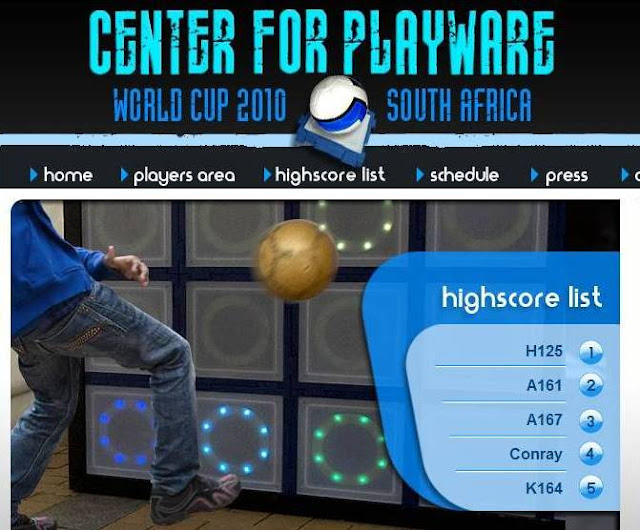Via: Center for Playware – Playware Street Soccer
Following my prior post Playware: Serious Games With Robots In Mind, here is another breakthrough achieved by the Center for Playware at DTU/DPU, Copenhagen.
Since the World Cup was kicked off in South Africa, youngsters have had the opportunity to participate in Laudrup, Hogh & Lund RoboSoccer 2010.
The game is collaboration between the internationally renowned professor in robotics, Henrik Hautop Lund from the Center for Playware at the Technical University of Denmark (DTU) / The Danish School of Education (DPU), and the Danish football players Brian Laudrup and Lars Høgh, who are behind Laudrup & Hogh Street 2010.
On the 14th of June, the Danish Minister of Culture, Per Stig Moller, opened the RoboSoccer World Cup 2010 at the Sci-Bono Discovery Center in Johannesburg, South Africa, where Professor Lund have been demonstrating Playware technology: easily movable tiles that react to light, sound and touch, making it possible to play soccer with others over the Internet. Professor Lund uses the modular interactive tiles as a game for developing technical soccer skills.
In the game, people compete for points by hitting the tiles: the faster and the higher they hit, the more points they get. These points are then uploaded onto a global high score list, as part of a World Cup tournament, with similar set-ups in Europe, Africa, and Asia, running in parallel with FIFA’s World Cup.
They have also live competitions, with fans from different continents playing the physical-virtual game against each other. During the Japan x Denmark game last week, fans in Tokyo were playing against Danish fans in South Africa at the pre-party next to the stadium for the FIFA’s World Cup match. Here, they compete live on a joint high score list for the specific event, being challenged minute by minute by the new high scores from South Africa and from Tokyo.
About Playware
Playware is about hardware and software that aim at producing play and playful experiences among users.
Examples of Playware products are numerous, with computer games as the most widespread and successful example, but there is also a fast-growing industry utilizing pervasive and ambient technology to create new kinds of play equipment and toys, which can be labeled “playware”.
The term "playware" was coined by Carsten Jessen Ph.D., Associate Professor at the Technical University of Denmark and the Danish School of Education, Aarhus University, and Henrik Hautop Lund, Ph.D. a professor at the Technical University of Denmark.
They first defined the term in their paper "Playware – Intelligent Technology for Children’s Play" to describe both a new area of research and a product type. Jessen and Lund argue that Playware is not so much the result of the rise of digital technology as it is the result of the fact that many children (and adults) in modern society do not have the necessary knowledge and skills needed to initiate games and play.
Earlier generations of children inherited games and learned play skills from older peers when participating in cross age activities on the street or in the backyard. According to Jessen and Lund, this is not the case today, inspiring them to conceive Playware.

